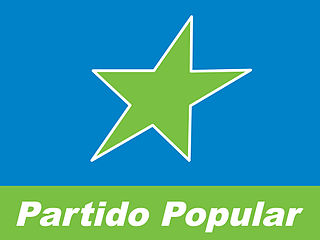Broad Popular Front (in Spanish: Frente Amplio Popular, FRAMPO) was a Panamanian small left-of-center political party.

Spanish or Castilian is a Western Romance language that originated in the Castile region of Spain and today has hundreds of millions of native speakers in the Americas and Spain. It is a global language and the world's second-most spoken native language, after Mandarin Chinese.

Panama, officially the Republic of Panama, is a country in Central America, bordered by Costa Rica to the west, Colombia to the southeast, the Caribbean Sea to the north, and the Pacific Ocean to the south. The capital and largest city is Panama City, whose metropolitan area is home to nearly half the country's 4 million people.
A political party is an organized group of people, often with common views, who come together to contest elections and hold power in the government. The party agrees on some proposed policies and programmes, with a view to promoting the collective good or furthering their supporters' interests.
The FRAMPO was created in 1977 by Renato Pereira, a former leader of the Federation of Students, and Miguel Montiel [1] and was accorded legal recognition as a party in 1979. [2]
The FRAMPO was a pro-Torrijos and a pro-government group oriented slightly to the left of the PRD. [3] It joined the UNADE coalition behind official candidate Nicolás Ardito Barletta in 1984, but lost legal status by failing to win 3 percent of total vote in the Panamanian general election, 1984. [4]


